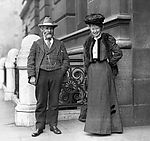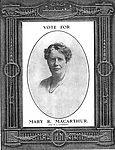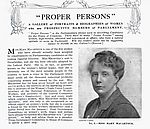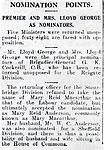 Mary photographed here with Keir Hardie in 1914
Mary photographed here with Keir Hardie in 1914 General Election 1918
General Election 1918 Article in Gentlewoman 14.12.1918
Article in Gentlewoman 14.12.1918 Extract from Mary's election address
Extract from Mary's election address News report - Election Defeat
News report - Election Defeat News report - Why the Women Failed
News report - Why the Women Failed News report - Mary Unable to Use Maiden Name
News report - Mary Unable to Use Maiden Name News report - Mary's Cheery Views on Election Defeat
News report - Mary's Cheery Views on Election Defeat News report - Mary's Cheer Up Message
News report - Mary's Cheer Up Message Election Defeat Dinner
Election Defeat Dinner

Women were allowed to stand for Parliament for the first time in 1918. Mary was one of sixteen women nominated as Labour Party candidates. The photographs and news reports we have included here help to tell the story of her election campaign and her defeat.
Mary stood for election in the Stourbridge area. She was very well known in the area, especially through her union work and through her support for the women chainmakers of Cradley Heath.
Mary stayed with a local family during her campaign. She went out every day, knocking on doors, trying to persuade people to vote Labour. She wanted the speedy return of the soldiers and sailors as the end of the war approached, with proper work found for them; a man's pay for women if they did a man's work;an equal chance for education from nursery to university; well planned and healthy houses at reasonable rents and the closing down of workhouses and a rise in old age pension paid at 60.
Mary was defeated by the Liberal, J.W.Wilson, but she came very close, losing by only 1,333 votes. Her pacifist views could have worked against her, and lack of time had been a problem. The Bill allowing women to stand was only passed five weeks before the election. It left little time to get officially adopted or to campaign. The whole idea of women standing for Parliament was new and would have taken people some time to get used to.
But Mary had a special handicap. The Returning Officer in her district would not let her appear on the ballot paper as Miss Macarthur. She had to use her married name of Anderson, a name she only used in private, and one that the people in the area were unfamiliar with.
Even though she lost, Mary stayed positive. She was convinced that they were bound to succeed in the future. She sent a telegram to her husband, Will Anderson, who had also been defeated. It said, "Cheer up! Better right than top!"
Mary said she would gladly stand again, but she never had the opportunity. She was diagnosed with cancer and died two years later, at the very height of her powers.
Rollover the captions in the box to see the available images in thumbnail format, click the caption to see the full-size image
| Reference: | 710 |
| Keywords: | |
| Archive Ref: | |
| Updated: | Thu 18 Oct 2007 - 1 |
| Interpretation written by | Barbara Harris |
| Author's organisation | |
| Organisation's website |